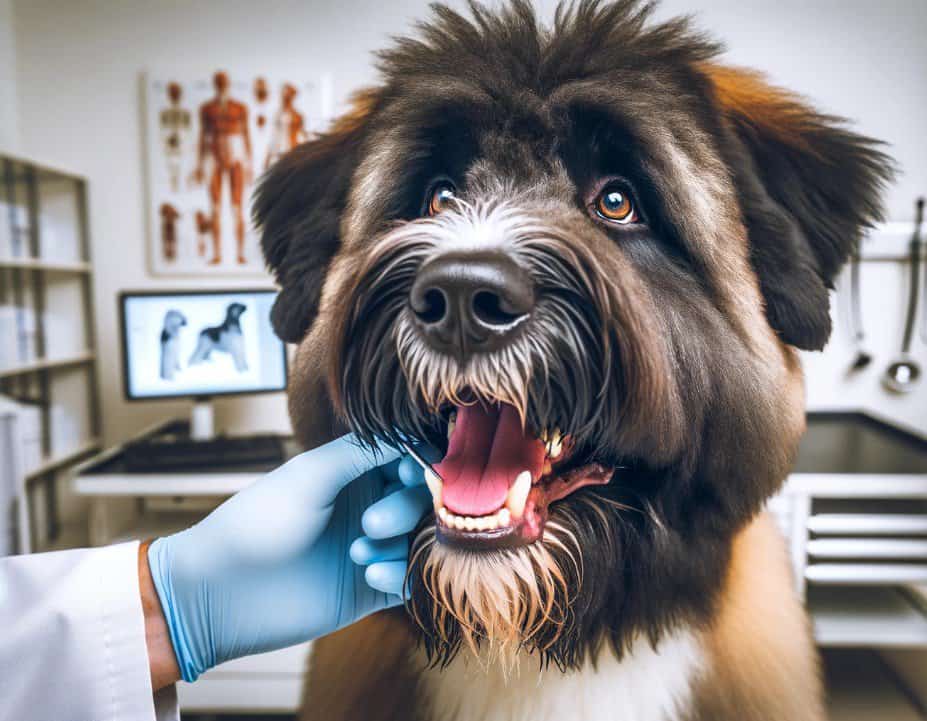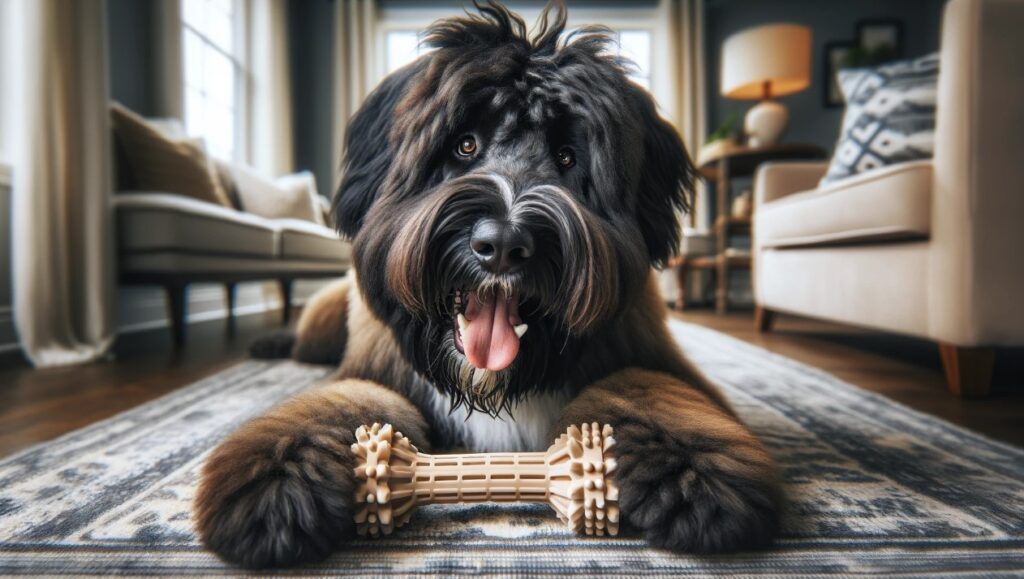Hi there, fellow dog lover! I’m Dr. Candy, your friendly holistic veterinarian. Today, we’re going to talk about a topic that’s close to my heart – Bouvier des Flandres dental health. As a dog parent, you know how important your furry friend’s health is, and their dental health is a key part of that. Did you know that dental issues can lead to other serious health problems in dogs? It’s true! A dog’s mouth is a gateway to their overall health. Poor oral hygiene can lead to not only bad breath but also heart disease, kidney problems, and more. So, let’s talk about how we can keep your Bouvier des Flandres’ pearly whites in top shape, shall we? We’ll discuss common dental health issues, conventional and holistic treatments, and my personal recommendations for dental chews and products. Let’s get started on this journey to better dog dental hygiene!

Just like in humans, dental health is a crucial aspect of overall health for your Bouvier des Flandres. By understanding the signs of dental disease, you can take proactive steps to ensure your furry friend maintains a healthy and happy mouth. So, let’s dive into the common indicators of dental problems that you should be looking out for in your Bouvier des Flandres.
Bad Breath
One of the most noticeable signs of dental disease in dogs is bad breath. While it’s normal for your Bouvier des Flandres to have a certain canine smell, persistent bad breath could indicate an underlying dental problem.
Difficulty Eating or Chewing
If your Bouvier des Flandres suddenly shows difficulty eating or chewing, or if they show a preference for softer food, it could be due to dental discomfort or pain. Keep an eye out for any changes in their eating habits.
Excessive Drooling
While some dog breeds naturally drool more than others, excessive drooling in your Bouvier des Flandres could be a sign of dental disease. Particularly if the saliva is tinged with blood, it’s time to consult your vet.
Changes in Behavior
Changes in behavior can also signal dental issues. If your Bouvier des Flandres is more irritable than usual, or if they’re constantly pawing at their mouth, they could be experiencing dental discomfort.
Visible Signs
Lastly, visible signs such as swollen or bleeding gums, yellow-brown crust on the teeth (tartar), and loose or missing teeth are clear indicators of dental disease.
Remember, prevention is always better than cure when it comes to Bouvier des Flandres Dental Health. Regular dental check-ups with your vet, combined with good oral hygiene practices at home, can go a long way in preventing dental disease. Keep an eye out for these signs and take action early to ensure your Bouvier des Flandres maintains a healthy and happy smile.
Common Dental Health Issues In Bouvier des Flandres
As a veterinarian, I have observed that Bouvier des Flandres dental health can be impacted by several common issues. These dogs are known for their robust health, but their dental health requires just as much attention as any other breed.
One of the most common issues is periodontal disease. This is an infection of the tissues that hold your dog’s teeth in place. It’s typically caused by poor dental hygiene, which allows plaque—a sticky film of bacteria—to build up on the teeth and harden.
Bad breath, or halitosis, is another common issue in Bouvier des Flandres. While it’s normal for your dog to have a certain ‘doggy breath’, excessively bad breath could indicate a problem with your dog’s oral health.
- Broken or fractured teeth are also common, especially in active breeds like the Bouvier des Flandres. These injuries can occur from chewing on hard objects, or during rough play.
Lastly, tooth decay is another common issue. Just like in humans, this can be caused by a diet high in sugar and carbohydrates, or from not cleaning the teeth regularly.
As part of your Bouvier des Flandres dental health routine, it’s important to regularly check for these issues. Early detection and treatment can help prevent more serious problems down the line.

Conventional Dental Health Treatments for Bouvier des Flandres
When it comes to maintaining the dental health of your Bouvier des Flandres, there are a couple of conventional treatments that you might be familiar with. These treatments are often recommended by veterinarians and are generally considered safe and effective.
Anesthetic Dental Cleanings
One of the most common treatments is anesthetic dental cleanings. This involves putting your dog under general anesthesia so that a deep cleaning can be performed. This is often necessary for dogs with severe dental disease, as it allows the vet to clean below the gum line and remove any tartar or plaque buildup that has accumulated.
It’s important to understand that while this treatment is generally safe, there are risks associated with anesthesia. Some Bouvier des Flandres may have health conditions such as heart problems, drug sensitivities, or seizures that could make anesthesia risky. Additionally, older dogs or those in poor health may not be good candidates for this type of treatment.
Potential Individual Health Obstacles
When considering dental treatments for your Bouvier des Flandres, it’s crucial to consider your dog’s individual health. Some dogs may have specific health obstacles that could affect their ability to undergo certain treatments. For example, dogs with heart problems may not be able to tolerate the stress of anesthesia. Similarly, dogs with drug sensitivities may have adverse reactions to certain medications used during dental procedures.
Another health obstacle could be age. If your Bouvier des Flandres is of extreme age, they might not be able to tolerate certain treatments. It’s important to discuss these potential obstacles with your vet, as they can help you determine the best course of action for your dog’s dental health.
Remember, every Bouvier des Flandres is unique and what works for one dog may not work for another. It’s important to work closely with your vet to ensure your dog’s dental health is managed in a way that’s best for them.
By understanding the conventional treatments available for Bouvier des Flandres dental health, and being aware of potential individual health obstacles, you can make informed decisions about your dog’s dental care.
When it comes to maintaining your Bouvier des Flandres dental health, I believe in a holistic approach. This means looking beyond the symptoms and addressing the root causes of dental issues. One of the most effective ways to do this is through diet and probiotics. Let’s explore this further.
Diet- Low Carbs, Avoid Added Sugars, Enzymes In Fresh Food
As a dog parent, you have control over what your Bouvier des Flandres eats. This means you can make a significant impact on their oral health through diet. Here’s what to consider:
- Low Carbs: Dogs don’t need a lot of carbohydrates in their diet. In fact, too many carbs can lead to plaque buildup on their teeth, leading to dental issues. I recommend a diet low in carbs to help maintain your Bouvier des Flandres dental health.
- Avoid Added Sugars: Just like in humans, sugar can be damaging to a dog’s teeth. Avoid dog foods and treats with added sugars. Instead, opt for natural, sugar-free options.
- Enzymes In Fresh Food: Fresh foods like raw meat, fruits, and vegetables contain natural enzymes that help break down plaque and tartar. Including these in your Bouvier des Flandres diet can help maintain their oral health.
Oral Health Specific Probiotics
Probiotics are beneficial bacteria that can help improve your Bouvier des Flandres dental health. They work by balancing the bacteria in your dog’s mouth, preventing the growth of harmful bacteria that cause dental diseases.
I highly recommend Probiora for Dogs, an oral health targeted probiotic. It’s easy to use – simply sprinkle it on your dog’s food once a day. This probiotic is specifically designed to promote oral health, helping to reduce plaque, tartar, and bad breath.
Remember, maintaining your Bouvier des Flandres dental health is a holistic process. It involves more than just brushing their teeth or getting them cleaned at the vet. With the right diet and probiotics, you can help prevent dental issues from developing in the first place.
As a dog parent, your dog’s health is in your hands. So, take the time to understand their needs and provide them with the best care possible. After all, a healthy dog is a happy dog!

Recommended Dental Chews & Products For Bouvier des Flandres
When it comes to maintaining the dental health of your Bouvier des Flandres, not all dental chews are created equal. Unfortunately, many commercially promoted dental chews, while marketed as beneficial to your dog’s oral health, often fall short of their promises.
The Failure of Commercially Promoted Dental Chews
It’s easy to be drawn in by the flashy marketing and promises of easy dental care, but many of these products simply don’t deliver. They are often loaded with unhealthy additives and preservatives, which can harm your dog’s overall health. Even more concerning is the fact that many of these chews are too hard and can cause oral injuries or digestive issues if swallowed in large pieces. Furthermore, many commercially promoted dental chews are not effective at removing plaque and tartar, the primary causes of dental disease in dogs.
Similarly, drinking water additives, often marketed as a simple solution to bad breath, can also be problematic. While they might provide temporary relief from bad breath, they can disrupt the balance of beneficial bacteria in your dog’s gut, potentially leading to other health issues.
Dr. Candy’s Recommended Dental Chews & Products
So, what should you be giving your Bouvier des Flandres to support their dental health? The answer lies in natural, single-source protein chews. These include:
- Tendons: These are a fantastic, natural option that your dog will love. They are tough enough to give your dog a good chew and help to remove plaque, but not so hard that they risk damaging your dog’s teeth.
- Raw Marrow Bones: These are rich in nutrients and perfect for keeping your dog entertained. The act of gnawing on the bone can help to clean your dog’s teeth, but remember to supervise your dog to prevent any potential choking hazards.
- Bully Sticks: These are a durable, long-lasting chew that are great for your dog’s oral health. They can help to scrape away plaque and tartar, and are also fully digestible.
When it comes to Bouvier des Flandres Dental Health, remember that the best care is preventative care. Regularly brushing your dog’s teeth and providing them with appropriate chews can go a long way in maintaining their dental health and avoiding potential dental problems. Remember, a healthy mouth leads to a happy, healthy dog.
Frequently Asked Questions
1. How can I prevent bad breath in my Bouvier des Flandres?
Regular dental care is essential to prevent bad breath in Bouvier des Flandres. Brush your dog’s teeth daily using a dog-specific toothbrush and toothpaste. Additionally, provide dental chews or toys that promote teeth cleaning and freshen breath.
2. What are some signs of dental problems in Bouvier des Flandres?
Signs of dental problems in Bouvier des Flandres may include bad breath, yellow or brown tartar buildup, swollen or bleeding gums, difficulty eating, pawing at the mouth, or loss of appetite. If you notice any of these signs, consult your veterinarian for a dental examination.
3. Can diet affect my Bouvier des Flandres’ dental health?
Yes, diet plays a significant role in your Bouvier des Flandres’ dental health. Feeding a high-quality dog food that promotes dental health, such as kibble designed to reduce tartar buildup, can help maintain good oral hygiene and prevent bad breath.
4. Are there any specific dental treatments for Bouvier des Flandres?
In addition to regular brushing and dental chews, professional dental cleanings performed by a veterinarian may be necessary for Bouvier des Flandres with severe dental issues. Your vet can assess the dental condition of your dog and recommend appropriate treatments, such as scaling, polishing, or extractions if required.
5. How often should I take my Bouvier des Flandres for a dental check-up?
It is recommended to take your Bouvier des Flandres for a dental check-up at least once a year. Regular dental examinations allow early detection of any dental problems and help maintain your dog’s oral health.
